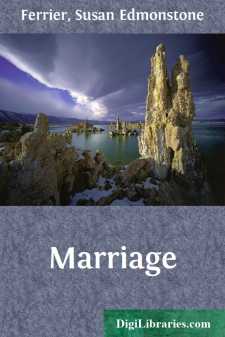Categories
- Antiques & Collectibles 13
- Architecture 36
- Art 48
- Bibles 22
- Biography & Autobiography 813
- Body, Mind & Spirit 142
- Business & Economics 28
- Children's Books 15
- Children's Fiction 12
- Computers 4
- Cooking 94
- Crafts & Hobbies 4
- Drama 346
- Education 46
- Family & Relationships 57
- Fiction 11828
- Games 19
- Gardening 17
- Health & Fitness 34
- History 1377
- House & Home 1
- Humor 147
- Juvenile Fiction 1873
- Juvenile Nonfiction 202
- Language Arts & Disciplines 88
- Law 16
- Literary Collections 686
- Literary Criticism 179
- Mathematics 13
- Medical 41
- Music 40
- Nature 179
- Non-Classifiable 1768
- Performing Arts 7
- Periodicals 1453
- Philosophy 64
- Photography 2
- Poetry 896
- Political Science 203
- Psychology 42
- Reference 154
- Religion 513
- Science 126
- Self-Help 84
- Social Science 81
- Sports & Recreation 34
- Study Aids 3
- Technology & Engineering 59
- Transportation 23
- Travel 463
- True Crime 29
Marriage
Description:
Excerpt
MISS FERRIER'S NOVELS. [1]
In November 1854 there died in Edinburgh one who might, with truth, be called almost the last, if not the last, of that literary galaxy that adorned Edinburgh society in the days of Scott, Jeffrey, Wilson, and others. Distinguished by the friendship and confidence of Sir Walter Scott, the name of Susan Edmonstone Ferrier is one that has become famous from her three clever, satirical, and most amusing novels of Marriage, The Inheritance, and _Destiny. _They exhibit, besides, a keen sense of the ludicrous almost unequalled. She may be said to have done for Scotland what Jane Austen and Maria Edgeworth have respectively done for England and Ireland—left portraits, painted in undying colours, of men and women that will live for ever in the hearts and minds of her readers. In the present redundant age of novel writers and novel-readers, and when one would suppose the supply must far exceed the demand from the amount of puerile and often at the same time prurient literature in the department of fiction that daily flows from the press, it is refreshing to turn to the vigorous and, above all, healthy moral tone of this lady's works. To the present generation they are as if they had never been, and to the question, "Did you ever read Marriage?" it is not uncommon in these times to get such an answer as, "No, never. Who wrote it?" "Miss Ferrier." "I never heard of her or her novels." It is with the view, therefore, of enlightening such benighted ones that I pen the following pages.
[1] Reprinted from the Temple Bar Magazine for November 1878, Vol I.
Miss Ferrier was the fourth and youngest daughter of James Ferrier, Writer to the Signet, and was born at Edinburgh, 7th of September 1782. Her father was bred to that profession in the office of a distant relative, Mr. Archibald Campbell of Succoth (great grandfather of the present Archbishop of Canterbury).To his valuable and extensive business, which included the management of all the Argyll estates, he ultimately succeeded. He was admitted as a member of the Society of Writers to the Signet in the year 1770. He was also appointed a Principal Clerk of Session through the influence (most strenuously exerted) of his friend and, patron, John, fifth Duke of Argyll, [1] and was a colleague in that office with Scott. He also numbered among his friends Henry Mackenzie, the "Man of Feeling," Dr. Hugh Blair, and last, though not least, Burns the poet. His father, John Ferrier, had been in the same office till his marriage with Grizzel, only daughter and heiress of Sir Walter Sandilands Hamilton, Bart., of Westport, county Linlithgow. [2] John Ferrier was the last Laird of Kirklands, county Renfrew, subsequently sold to Lord Blantyre. Mr. James Ferrier was the third son of his parents, and was born 1744. [3] Miss Ferrier was in the habit of frequently visiting at Inveraray Castle in company with her father, and while there had ample opportunity afforded her of studying fashionable life in all its varied and capricious moods, and which have been preserved to posterity in her admirable delineations of character....


